Node.js用途很广,常用来开发服务、桌面应用等被开发者熟知,Node.js还有另外一个非常实用的场景 - 命令行应用(后文统称CLI)。本文将介绍CLI的开发流程、常用的功能,并以meet-cli为例实战演练,从零开始一步步开发一个可以在生产中使用(read world)的CLI工具。meet-cli现已开源,读者也可以直接下载查看。
Why CLI?
在深入开发之前,我们先了解几个问题。
CLI是什么?
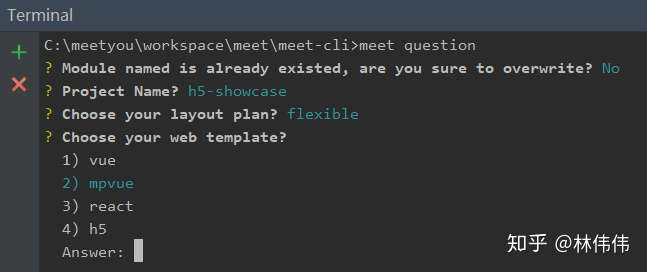
Command Line Interface,顾名思义是一种通过命令行来交互的工具或者说应用。SPA应用中常用的如vue-cli, angular-cli, node.js开发搭建express-generator,orm框架sequelize-cli,还有我们最常用的webpack,npm等。他们是web开发者的辅助工具,旨在减少低级重复劳动,专注业务提高开发效率,规范develop workflow。
举比较典型的angular-cli 为例,读者可以查看它的npm说明文档,它可以让angular开发者快速创建最佳实践的angular应用,快速启动,快速创建component、directive、pipe、service、module等,用过的都说很好用,现在各个框架都有配套CLI。
CLI的根据不同业务场景有不同的功能,但万变不离其宗,本质都是通过命令行交互的方式在本地电脑运行代码,执行一些任务。
CLI有什么好处?
我们可以从工作中总结繁杂、有规律可循、或者简单重复劳动的工作用CLI来完成,只需一些命令,快速完成简单基础劳动。以下是我对现有工作中的可以用CLI工具实现的总结举例:
- 快速生成应用模板,如vue-cli等根据与开发者的一些交互式问答生成应用框架
- 创建module模板文件,如angular-cli,创建component,module;sequelize-cli 创建与mysql表映射的model等
- 服务启动,如ng serve
- eslint,代码校验,如vue,angular,基本都具备此功能
- 自动化测试 如vue,angular,基本都具备此功能
- 编译build,如vue,angular,基本都具备此功能
- *编译分析,利用webpack插件进行分析
- *git操作
- *生成的代码上传CDN
- *还可以是小工具用途的功能,如http请求api、图片压缩、生成雪碧图等等,只要你想做的都能做
总体而言就是一些快捷的操作替代人工重复劳动,提升开发效率。
与npm scripts的对比
npm scripts也可以实现开发工作流,通过在package.json 中的scripts对象上配置相关npm 命令,执行相关js来达到相同的目的;
但是cli工具与npm scripts相比有什么优势呢?
- npm scripts是某个具体项目的,只能在该项目内使用,cli可以是全局安装的,多个项目使用;
- 使用npm scripts 在业务工程里面嵌入工作流,耦合太高;使用cli 可以让业务代码工作流相关代码剥离,业务代码专注业务
- cli工具可以不断迭代开发,演进,沉淀。
meet-cli 针对项目实际需求,贴合工作实际需求应运而生。接下来看看meet-cli的一些功能;
MEET-CLI
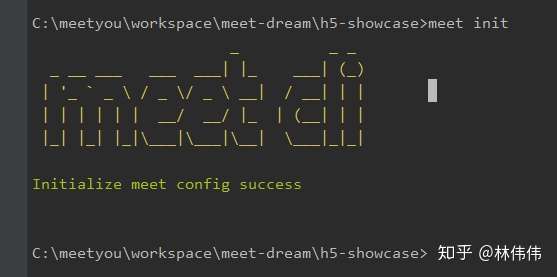
本文基于
美柚的web开发的工作主要是产品内hybrid应用的 h5部分,以及广告、营销互动类的h5、往往互相独立,工作中发现有以下一些问题:
- 每个h5的创建一些列目录和文件,每个h5都有公共的基础代码
- 每次新功能都需要配置相关的npm watch和build命令,我们需要一个创建模板的功能
- 各个工程之间都有一套自己的build代码,上传CDN的代码,各不相同,开发人员垮项目开发上手慢
- 每次创建新工程build的代码都需要重复做一次(或者通过复制粘贴的办法),我们需要一个公共的上传功能
基于工作中的问题,额外我再加了点小功能,meet-cli诞生了,下面展示下他的一些功能;
1、meet -help查看功能列表
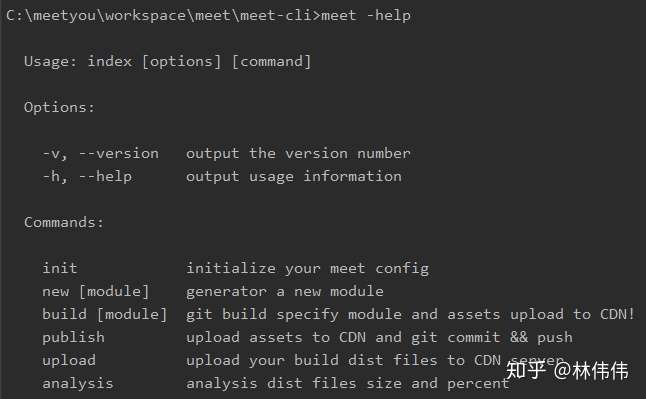
一个cli工具都具有查看帮助的功能,图中可以看出meet-cli具备创建module、编译、发布(git提交与资源上传cdn)、单独指定文件上传cdn功能、分析生成文件功能
接下来快速演示上述几个主要功能
2、meet init
meet init 会在工程根目录下生成meet.config.js 文件,用以配置meet工具的使用
const path = require('path');
module.exports = {
// module 生成的目标目录
modulePath: path.resolve('public'),
// module template 目录
moduleTemplatePath: path.resolve('meet/templates/module'),
// project git url
gitUrl:'http://gitlab.meiyou.com/advertise/ad-activity.git',
// module build npm command
npmBuildCommand:'npm run release:',
// upload assets config
upload:{
// CDN Server
server:'alioss',// 阿里OSS - 'alioss', 七牛云 - 'qn'
// alioss server config
config:{
accessKeyId: "LTAIovxxxx0",
accessKeySecret: "5xkXYxxxxf6wlzD8",
bucket: "adstatic",
region: "oss-cn-beijing",
srcDir: path.resolve('public/assets'),// 要上传的dist文件夹
ignoreDir: false,
deduplication: true,
prefix: "ad-activity.meiyou.com",
}
},
// is publish after build?
autoPublish: true,
// 测试提交文字
};
3、meet new [module]
快速创建h5模块目录和基础文件,基础css,html,js,必要依赖,(还可以进行相关express路由配置,指定模块编译配置)
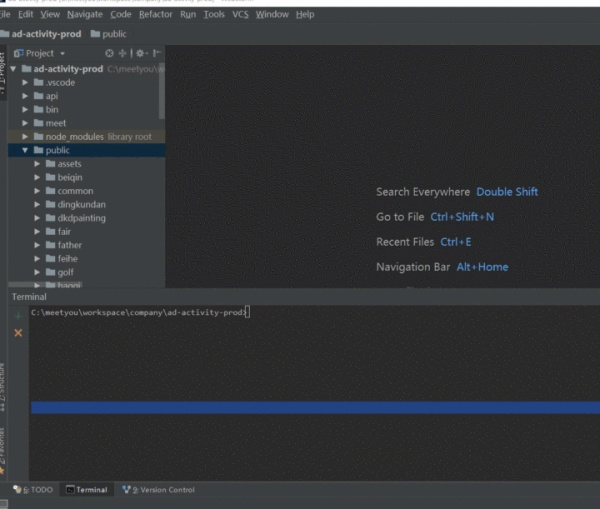
4、meet build [module]
build模块,生成代码,用webpack-bundle-analyzer 进行分析,可视化显示资源占比,可以一目了然的查看代码体积上是否存在问题,对于性能优化是一个好处
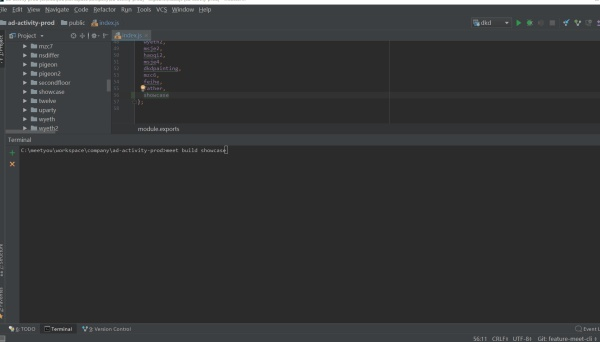
5、meet publish (git操作+upload CDN)
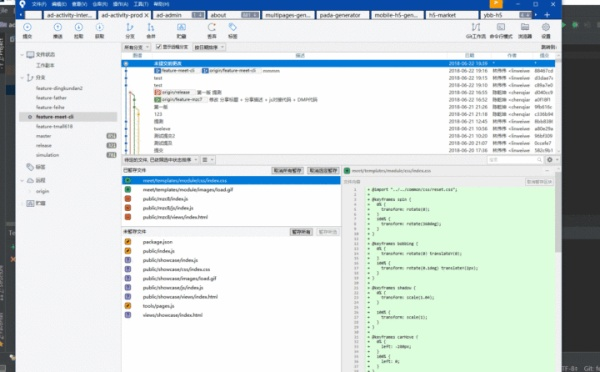
还有meet analysis 、meet upload 等功能都是上述功能的局部。meet upload 可以指定上传某个路径下的资源,作为上传工具单独而存在。
目前实用功能比较少,后面还会增加一些功能
上面这一波操作很酷, 那是怎么实现呢,我们的核心内容现在才登场,如何从零开始开发一个CLI呢?
从零开发CLI
我们将从零开始开发meet-cli来实战演示一个完整的cli的开发过程;(注:为了不影响我电脑的meet-cli,我将后文的cli demo命名为mei-cli ,大家见谅!)
基础模块
1、创建npm模块
执行命令,创建npm模块
npm init -y
得到
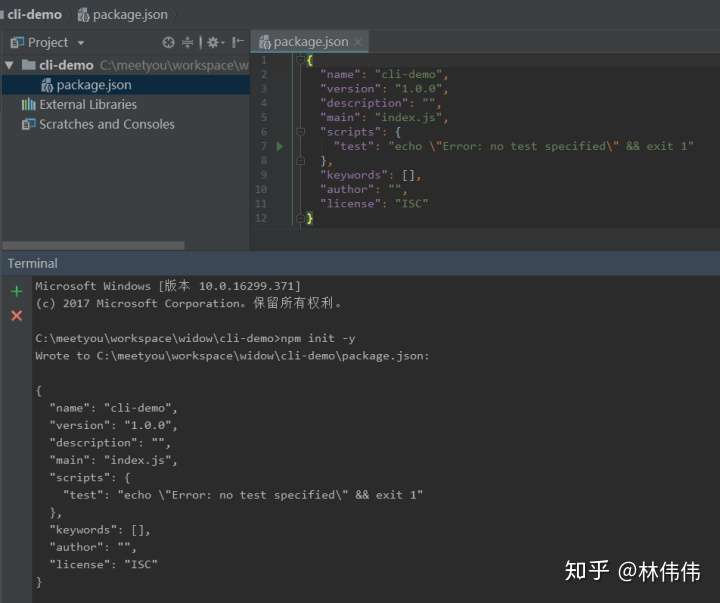
上面这步骤大家都很熟悉;
2、bin 入口文件
在package.json 文件增加bin的对象
{
"name": "cli-demo",
"version": "1.0.0",
"description": "",
"main": "index.js",
"bin":{
"mei": "./bin/index.js"
},
"scripts": {
"test": "echo \"Error: no test specified\" && exit 1"
},
"keywords": [],
"author": "",
"license": "ISC"
}
js 中首行设置如下代码:
#!/usr/bin/env node
上面这句话是用来告诉操作系统用node来运行这个文件
可以在js中console.log('hello mei')
3、全局安装
执行npm install -g ,将mei-cli安装到全局。so,最简单的cli诞生了,任意找个位置输入mei 命令,就执行了你的 ./bin/index.js文件,console.log了一句话,‘hello mei’。可以将mei-cli模块发布到npm上,这样就可以给社区使用了。如何发布npm模块,这里有一篇我的博客可以查看。
node.js 知识
node.js 具有filesystem模块,可以让开发者对文件进行读写、创建、删除等操作;
process、child_process、path、以及commonjs模块化知识等
基础掌握了,我们来认识一些常用组件😊
- commander CLI常用开发框架
- chalk 终端文字加颜色js组件
- clui spinners、sparklines、progress bars图样显示组件
- shelljs node.js运行shell命令组件
- blessed-contrib 命令行可视化组件
- lnquirer 命令行交互信息收集组件
- figlet FIGlet is a program that creates large characters out of ordinary screen characters
此外,还有游大神开发的meet-ali-oss上传模块
上述这些组件足以让你开发酷炫的cli,如果不够,这里还有50个组件 任你挑选;
我们要完成的cli主体结构图
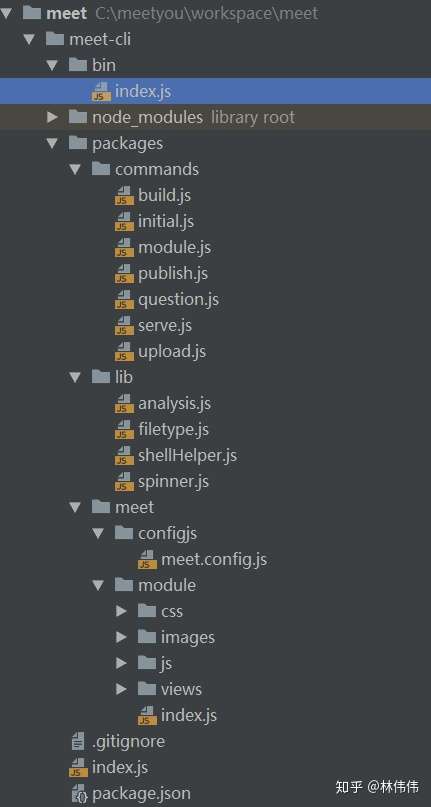
文件结构要划分合理,index.js是主入口文件, commands专门放主要的命令功能逻辑,根据命令模块划分,比较细的功能实现可以抽成组件放在lib文件夹中,剩余的配置,以及模板等放meet文件夹中
主入口文件
#!/usr/bin/env node
const path = require('path');
const fs = require('fs');
const program = require('commander');
const gmodule = require('../packages/commands/module');
// const serve = require('../packages/commands/serve');
const question = require('../packages/commands/question');
const build = require('../packages/commands/build');
const publish = require('../packages/commands/publish');
const upload = require('../packages/commands/upload');
const analysis = require('../packages/lib/analysis');
const initial = require('../packages/commands/initial');
let config = {};
// 配置文件如果存在则读取
if(fs.existsSync(path.resolve('meet.config.js'))){
config = require(path.resolve('meet.config.js'));
}
program
.version('1.0.0','-v, --version')
.command('init')
.description('initialize your meet config')
.action(initial);
program
.command('new [module]')
.description('generator a new module')
.action(function(module){
gmodule(config,module)
});
program
.command('build [module]')
.description('git build specify module and assets upload to CDN!')
.action(function(module){
build(config,module)
});
program
.command('publish')
.description('upload assets to CDN and git commit && push')
.action(function(){
publish(config)
});
program
.command('upload')
.description('upload your build dist files to CDN server')
.action(function () {
upload(config.upload);
});
program
.command('analysis')
.description('analysis dist files size and percent')
.action(function () {
analysis(config.upload.config.srcDir);
});
program
.command('question')
.description('analysis dist files size and percent')
.action(function(){
question()
});
program.parse(process.argv);
主入口文件利用commander监测终端输入命令时,触发相应的模块运行。commander会自动生成mei -help的命令,该命令用来显示支持的命令。命令命名尽可能短、见名知意,不支持的命令有相关提示,运行错误有正确的提示和响应,是cli的最佳实践。
这里在主入口文件中读取了meet.config.js,把相应的的配置信息传递给对应模块。如把CDN上传的配置信息传给上传模块,把
用了commander发现这cli也没有什么技术含量😂。
meet new [module] 触发运行的js
const path = require('path');
const fs = require('fs');
const chalk = require('chalk');
const inquirer = require('inquirer');
// 要拷贝的目标所在路径
let templatePath;
// 目标文件夹根路径
let targetRootPath;
function deleteFolderRecursive (path) {
if (fs.existsSync(path)) {
fs.readdirSync(path).forEach(function(file, index){
var curPath = path + "/" + file;
if (fs.lstatSync(curPath).isDirectory()) {
// recurse
deleteFolderRecursive(curPath);
} else { // delete file
fs.unlinkSync(curPath);
}
});
fs.rmdirSync(path);
}
};
function copyTemplates(name){
function readAndCopyFile(parentPath,tempPath){
let files = fs.readdirSync(parentPath);
files.forEach((file)=>{
let curPath = `${parentPath}/${file}`;
let stat = fs.statSync(curPath);
let filePath = `${targetRootPath}/${tempPath}/${file}`;
if(stat.isDirectory()){
fs.mkdirSync(filePath);
readAndCopyFile(`${parentPath}/${file}`,`${tempPath}/${file}`);
}
else{
const contents = fs.readFileSync(curPath,'utf8');
fs.writeFileSync(filePath,contents, 'utf8');
}
});
}
readAndCopyFile(templatePath,name);
}
function generateModule(meetConfig,name){
templatePath = typeof meetConfig.moduleTemplatePath !== 'undefined'? path.resolve(meetConfig.moduleTemplatePath):path.join(__dirname,'..','meet/module');
targetRootPath = meetConfig.modulePath;
let targetDir = path.join(targetRootPath,name);
if(fs.existsSync(targetDir)){
// 如果已存在改模块,提问开发者是否覆盖该模块
inquirer.prompt([
{
name:'module-overwrite',
type:'confirm',
message:`Module named ${name} is already existed, are you sure to overwrite?`,
validate: function(input){
if(input.lowerCase !== 'y' && input.lowerCase !== 'n' ){
return 'Please input y/n !'
}
else{
return true;
}
}
}
])
.then(answers=>{
console.log('answers',answers);
// 如果确定覆盖
if(answers['module-overwrite']){
// 删除文件夹
deleteFolderRecursive(targetDir);
console.log(chalk.yellow(`Module already existed , removing!`));
//创建新模块文件夹
fs.mkdirSync(targetDir);
copyTemplates(name);
console.log(chalk.green(`Generate new module "${name}" finished!`));
}
})
.catch(err=>{
console.log(chalk.red(err));
})
}
else{
//创建新模块文件夹
fs.mkdirSync(targetDir);
copyTemplates(name);
console.log(chalk.green(`Generate new module "${name}" finished!`));
}
}
module.exports = generateModule;
主要逻辑是根据用户配置的templatePath 与targetRootPath,遍历templatePath路径下的所有文件夹与文件,copy文件到targetRootPath,如果已经存在则提示是否覆盖。
上面说明templatePath 是一个灵活的路径,模板可以在mei-cli中,也可以在任何一个位置,只要指定了正确的路径,就能实现相同的结果。此功能可以使用任何web框架,任何web框架都可以准备他的module模板,它的作用就是把模板文件copy到指定位置,也就是一键生成模板。
看到这里,发现确实没什么技术含量。
meet publish
const chalk = require('chalk');
const inquirer = require('inquirer');
const shellHelper = require('../lib/shellHelper');
const upload = require('./upload');
let config = {
autoPublish: false
};
function gitCommit(){
// 发布,提示输入commit 信息
inquirer.prompt([
{
name:'message',
type:'input',
message:`Enter your publish message \n `
}
])
.then(answers=>{
let message = answers.message;
shellHelper.series([
'git pull',
'git add .',
`git commit -m "${message}"`,
'git push',
], function(err){
if(err){
console.log(chalk.red(err));
process.exit(0);
}
console.log(chalk.green('Git push finished!'));
process.exit(0);
});
})
.catch(err=>{
console.log(chalk.red(err));
});
}
function publish(meetConfig){
Object.assign(config,meetConfig);
upload(config.upload)
.then(res=>{
console.log(chalk.green('Upload To CDN finished!'));
if(config.autoPublish === true){
gitCommit();
}
})
.catch(err=>{
console.log(chalk.red(err));
})
}
module.exports = publish;
meet publish 原理是利用node.js child_process顺序执行多个git命令进行git提交,利用meet-ali-oss进行资源文件上传。
剩下的还有build、initial、upload,analysis等功能,都是类似的,不再贴代码进行一一阐述了,读者可以下载meet-cli进行查看
git clone https://github.com/linweiwei123/meet-cli.git
除此之外,还可以放飞眼界,在你的cli中加入更多功能,比如进行与服务器进行通信(用axios http模块请求)、实时通信、分享CLI命令界面等等(有些很鸡肋),只要是符合实际需要的,大胆设想,大胆实现,让你的CLI无比强大。
功能逻辑见仁见智,开发者可以发挥个人的智慧开发适合自己的CLI。
CLI开发中还有一些地方需要开发者注意。
注意事项
- .gitignore,.npmignore 跟npm模块一样CLI也需要注意提交文件内容限制
- package.json 中注意dependencies与devDependencies的区别
- 良好的文档描述
到此meet-cli就开发完成了,还可以发布到npm上给社区使用(适合的话)。
未来计划
todolist
- 增加图片处理命令 meet comp [path],用于压缩,生成webp
- 生成gitignore文件命令
- 生成eslint配置
- 与multipages-generator合并,形成完整的h5开发工作流
- 类似vue-cli 通过网页操作替代cli交互
总结
本文主要介绍了CLI的入门,常见的组件以及用法,常见的CLI功能。CLI是web开发的辅助工具,旨在提高web工作效率,希望本文能给大家的工作带来一些启迪与帮助😎!